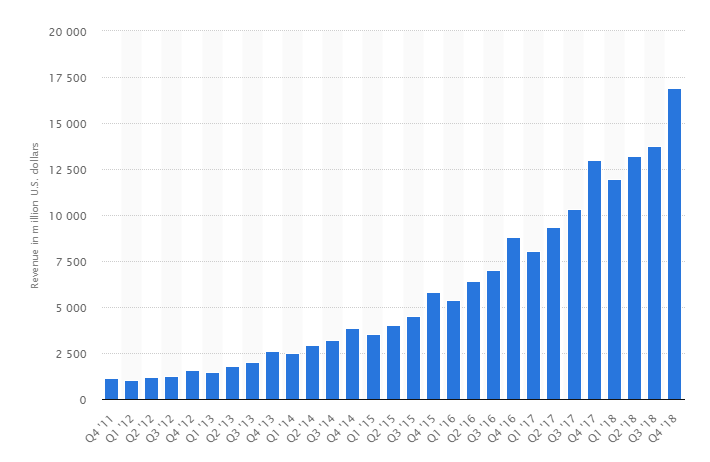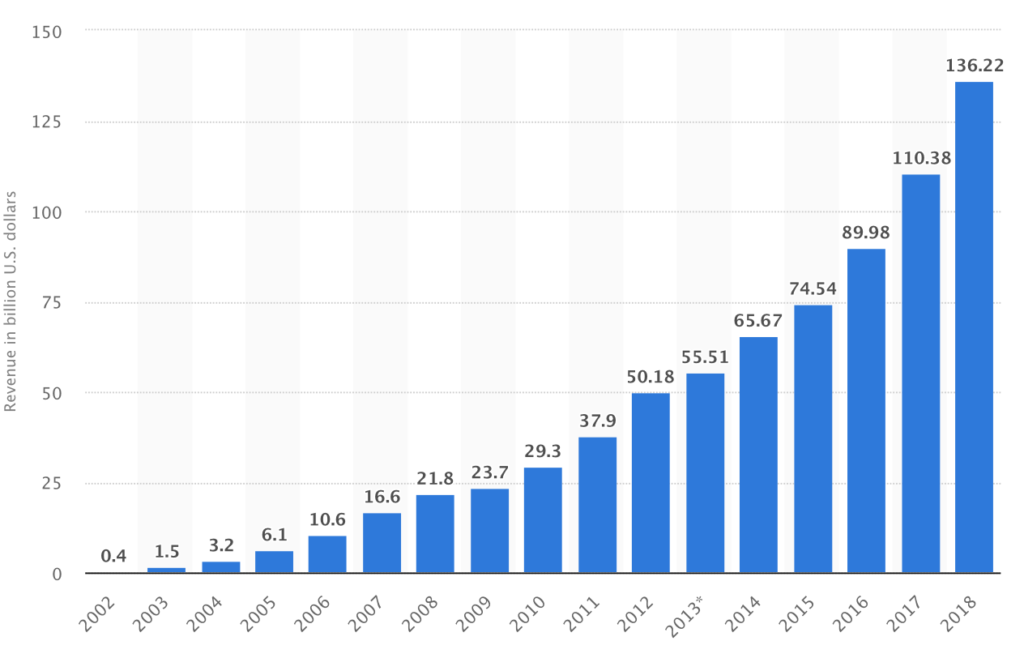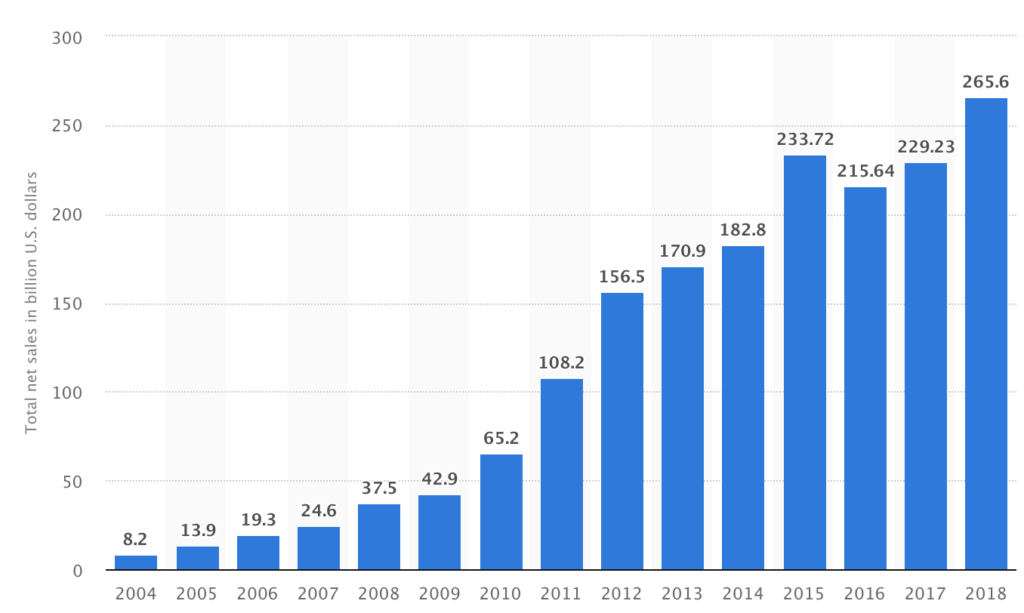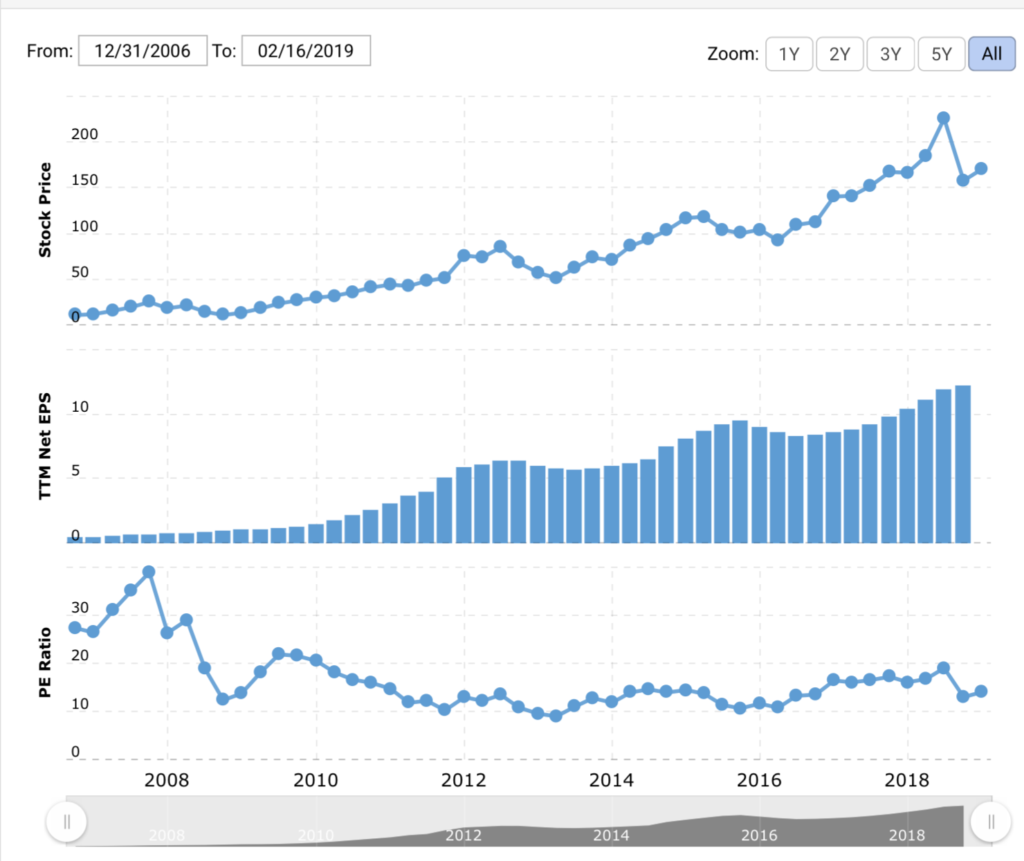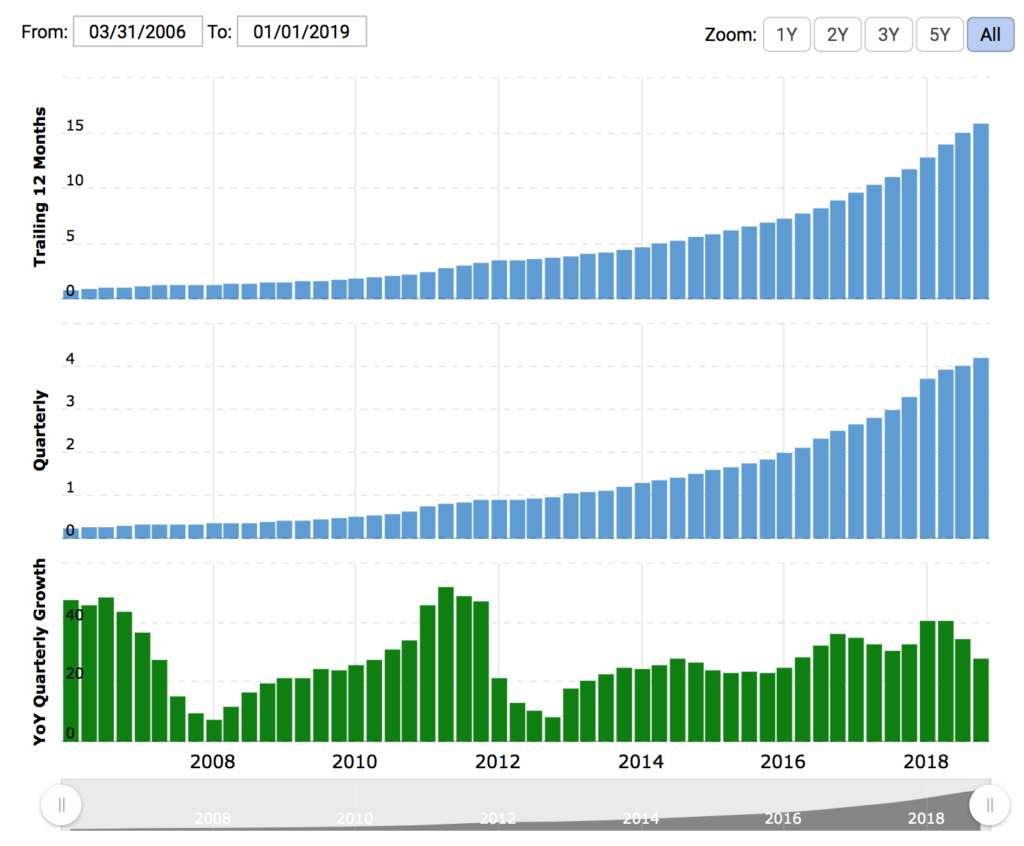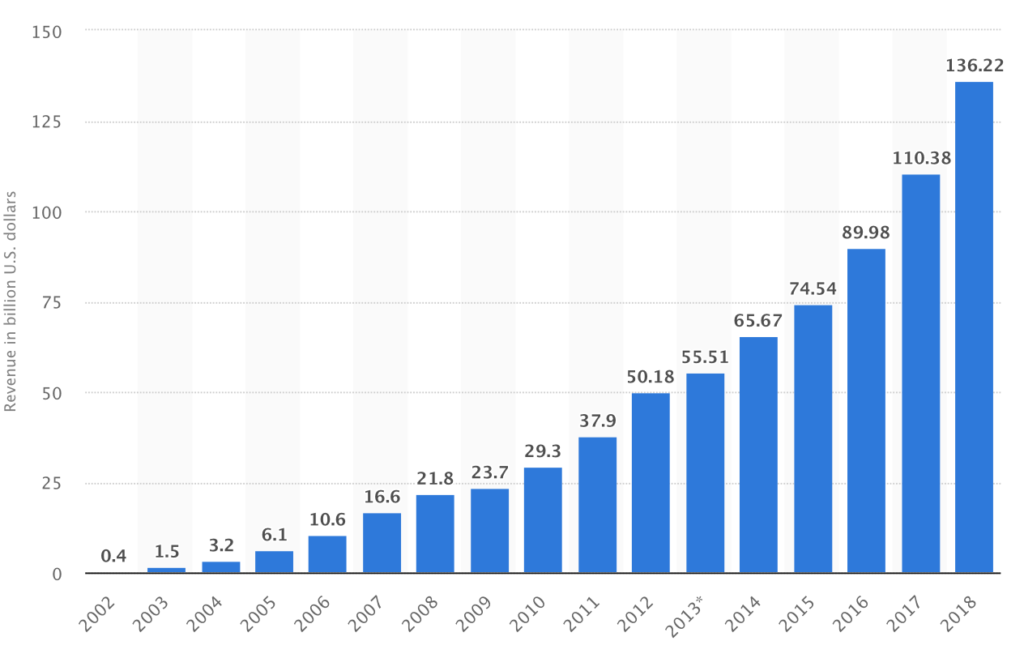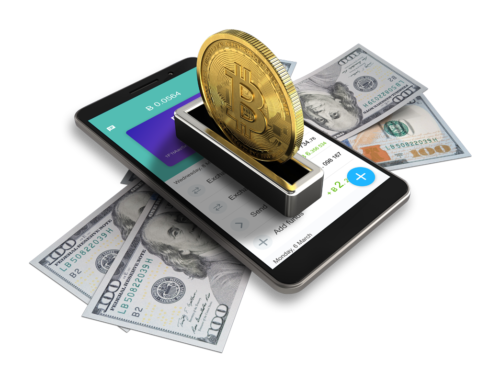The FAANG in 2019
2018 is a roller coaster ride for investors, a lot has happened that even the experts got confused and it is no different for the mega-cap FAANG. FAANG stands for the 5 tech giants Facebook Inc. (FB), Amazon.com Inc. (AMZN), Apple Inc. (AAPL), Netflix Inc. (NFLX), and Google parent Alphabet Inc. (GOOGL). This group which comprises more than 10% of the S&P 500 whose market cap is about 70% to 80% of the US capitalization, has been the driving force of the bull market gains.
FAANG is usually viewed as a group and a favorite theme by most investors but each company has its own peculiarity and individuality.
Facebook made 55.838 billion in 2018 mostly coming from digital advertisements with an increase of 20% from last year. Here is the data from Statista:
2018, however, is the most challenging year of Facebook aside from its year of inception. In this year, they had faced more than 10 scandals sending its stock price reeling down. Here are some:
-
In February 2018, 13 employees of Russia’s Internet Research Agency created fake US accounts on both Instagram and Facebook to send conflict among Americans before the election.
-
In March 2018, the UN is blaming Facebook for allowing fake news to spread over the Rohingya issue sending the Rohingya Muslims in Myanmar to their grave. In the same month, as if the Rohingya issue is not yet enough, The New York Times and The Guardian, exposed Cambridge Analytica, a political data firm, for misappropriating data millions of Americans before the 2016 election. Facebook, later on, confided that around 87million user data was accessed by the said firm.
-
2 months after, Democrats released a statement saying that 3500 ads were purchased by the Russian Internet Research Agency. Dozens of these purchased ads prompt the user to install FaceMusic, a malicious extension infected by malware where the landing page is musicfb.info that is registered in t. Petersburg, Russia, where the IRA is based.
-
June, The New Yor Times again exposed Facebook for deals with device manufacturers like Apple, Amazon, Microsoft, and Blackberry on sharing Facebook users’ personal data.
-
In the series of events, Facebook responded to the House Energy and Commerce Committee revealed somewhere in the 700-page letter that it gave dozens of companies extended access to users’ friend’s data one of which is the Russian internet giant Mail.ru, whose main investor was Alisher Usmanov, a businessman with ties to Russian president Vladimir Putin.
-
They eventually shut down more suspicious accounts and also bans Alex Jones, a conspiracy theorist known for his hate speeches. It was Apple who first pulled the plug on Alex Jones then Facebook and eventually Youtube and Twitter followed. These companies, however, faced several months of public scrutiny for allowing Jones to spread disinformation and hate contents.
-
And if there are Russians then there are others too, in August, Iranian troll accounts and pages were shut down. In another round of clean up done in October, additional 82 linked to Iran posing as US and UK citizens were removed.
-
There were also issues of internal culture wars according to NYT and Instagram CEO Kevin Systrom and co-founder Mike Krieger stepped down.
-
And just like any other websites, Facebook got hacked with over 30 million accounts compromised.
-
And just before the year ends, Facebook screwed up once again by revealing that there may be 1500 apps had accessed to users’ photos, whether they shared those photos or not.
Amazon
Currently, the largest in the E-Commerce business diverging to cloud computing and recently into artificial intelligence with the launch of Alexa with Echo Dot being the #1 selling product on Amazon worldwide. Last January 31, Amazon released their quarterly report boasting of a 31% increase in its net sales from 177.91 billion in 2017 to 232.89 billion in 2018. Started in 1997 as a bookseller it now became the vendor of any product imaginable. 21 years in the business and yet the company is still aggressively growing.
Just a few days ago, it bought a Silicon Valley Wifi Router maker, Eero, to aid its growing line of smart home products such as Echo, Ring doorbell and Blink security camera online.
Amazon Echo is a hands-free speaker you control with your voice. It connects to the Alexa Voice Service to play music, answer questions, make calls, send and receive messages, provide information, news, sports scores, weather and many more.
Ring doorbell is a smart doorbell which allows users to know who is at their doorstep remotely by only using the smartphone app. Amazon bought Ring, the smart doorbell manufacturer, at a price of $1bn in early 2018.
On the other hand, Blink,the company of Blink security camera was purchased in December 2017 by Amazon. These cameras are supposed to last for two years with just a pair of AA batteries, saving the owner of have to worry about wiring. They’re also inexpensive, running just $99 to $129.
Amazon has seen the potential of artificial intelligence and as early as 2015, it started heading in that direction with google just a little behind them. The company began by purchasing Annapurna labs, then finally a smart home connect kit in Sept 2018 and just in November 2018, it launched the first self-developed ARM architecture cloud server CPU Graviton and the first AI cloud chip Inferentia.
These developments and aggressive investments makes it exciting to watch out for this year.
APPLE
Apple started in 1977 selling computers, computer peripherals and computer software, from there it later sold ipod in 2005 then introduced Iphone in 2007. Before Steve Jobs resigned in 2011, the company introduced Ipad, a touch-screen device intermediate in size between a laptop computer and a smartphone and a cloud computing sevice called, Icloud.
Tim Cook replaced Steve Jobs in 2011 and instead of creating new products, he brought out new versions of Iphone and Ipad. Only in 2014 did the company made a major step by buying Beats, a headphone manufacturer and music-streaming company for $3 billion and a year later introducing Apple Watch.
From the Macintosh, Iphone became the company’s flagship. In 2018, it reported a net sales of 265.6, a 15% increase from its 229.23 report in 2017.
This first quarter of 2019 however, Apple reported a 15% decline while services revenue increased by 19%. Revenue from Mac and Wearables, Home and Accessories also reached all-time highs, growing 9 percent and 33 percent, respectively, and revenue from iPad grew 17 percent. While other services increased, the total net sales in Q1 decreased from 88.293 in 2018 to 84.310 in 2019. This oldest and by far the most mature among the FAANG has low P/E ratio showing lower prospects for growth. Below is the data from macrotrends.
And just like google play, the App Store, another source of income for Apple is now facing a problem with some of the application providers no longer accepting payments through its system. Netflix is a good example of this, just in Dec. 2018, they had announced that no longer support iTunes as a method of payment for new members. Reason behind? the 15% (previously 30%) cut on recurring in-app subscriptions on IOS leaving the developers only 85% of the revenue.
Netflix
Netflix, a media services provider founded in 1997 by Reed Hastings and Marc Rudolph with its subscription-based streaming OTT service which offers online streaming of a library of films and television programs, including those produced in-house as its primary business. It has achieved its one year gross sales in 2017 $11.6M in just 3 quarters in 2018. It is currently adding nine million subscribers quarterly with the US having 60million subscribers. Netflix’s initial business model included DVD sales and rental by mail, but Hastings dropped the sales after a year its founding to focus on the DVD rental business instead. 10 years after, it introduced streaming media while still retaining the DVD and Blu-ray rental service.
In 2010, it expanded internationally and in 2012, it entered into content production industry. From then on, they have greatly expanded the production and distribution of both film and television series and by January 2016 they have operated in more than 190 countries. This brave steps however exposed them to billions of debt but its yearly growth is promising. See data from macrotrends:
Alphabet (Google)
Alphabet Inc. is the holding company of Google, the leader among search engines. Most of their income comes from digital ads, sale of digital contents, cloud and video streaming through You Tube. Google is also engaged in in infrastructure, data management, analytics and artificial intelligence (AI). They have Google Assistant where you can talk with Google, Google Maps to assist users in navigation, Google photos which helps users store and organize all of their photos and a browser platform, Chrome.
The Company competes with Microsoft, Yahoo, Yandex, Baidu, Naver, Seznam, Amazon, eBay, Kayak, LinkedIn, WebMD, Facebook, Twitter, Criteo, AppNexus, Netflix, Hulu and Apple.
In the recent quarterly report by Google, it surpassed Wallstreet forcast on EPS at $12.77 per share against $10.82 estimate by Refinitiv consensus. They even reported $136.22 billion annual revenue, a 23.42% increase from 2017.
source: Statista: Google Annual Revenue 2018
While this is all good, their advertising revenue on cost per click declined by 29% from last year and 9% from last quarter. This significant decline alarms most of the investors and thinking that Google’s pricing power for ads is going down.
Amazon’s rising presence in digital advertising threatens Google seeing heightened pricing pressure while its cost in doing business is also going up.
After Seven Months into the Pandemic
Gold continuously moves higher in the past months and [...]
Wirex joins MasterCard Crypto Program
Cryptocurrency is here to stay. The banks know about [...]


Level 2 – Option Trading Guide to Collars: Learn to Protect Your Stocks





